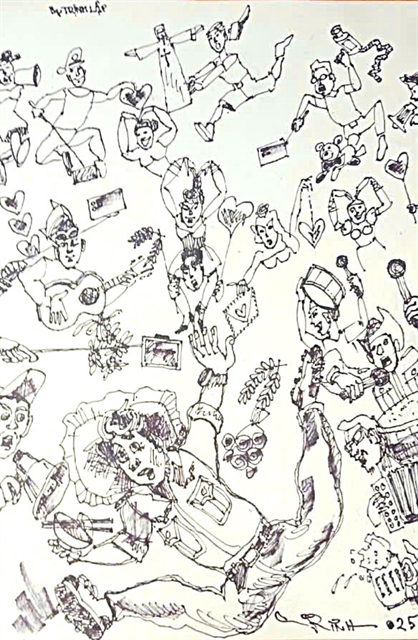 Talk Around Town
Talk Around Town

 |
| Illustration by Trịnh Lập |
By Thanh Nga
Lê Hoàng Hiệp, a soldier, has found himself unexpectedly thrust into the spotlight as an entertainment icon. His rapid rise to fame, however, raises important questions about the boundaries of admiration, as the line between genuine affection and harassment becomes increasingly blurred.
As the nation celebrated significant national events in recent times, images of soldiers parading proudly captured the attention of social media users. Among them, Senior Lieutenant Hiệp became an instant sensation, after a fleeting moment of stepping out of a car. That brief clip quickly went viral, turning him into a symbol of the enduring spirit of Vietnamese soldiers during these national festivities.
Today, the hashtag #lehoanghiep has amassed over 85,000 tagged videos and more than 2.3 billion views on TikTok. This phenomenon is particularly striking given that Hiệp is not a traditional celebrity but a soldier - an anomaly in a space usually dominated by artists.
While entertainers often rely on elaborate tricks to attract views, Hiệp's appeal lies in the simplicity of his actions: stepping out of a vehicle, brushing his hair back and waving. This natural charisma has sparked a wave of enthusiasm, but it also poses challenges. A growing community of fans has emerged, forming groups that demand interactions - messages of thanks, replies to inboxes and even livestreams built around romanticised scenarios of their dreams.
Journalist Thanh Lương, deputy editor-in-chief of Today magazine, reflected on this phenomenon: “An event that seemed dry and serious suddenly transformed with the appearance of Sr Lt Lê Hoàng Hiệp. A post praising him and the military garnered over 4,400 likes and thousands of shares. His fans are polite and civilised. Instead of engaging in pointless arguments, social media became a platform for positive energy."
"Hiệp, while not a conventional star, is proof of the power of authentic content. He doesn’t sing or dance, he simply embodies a spirit that resonates deeply with the public.
"In an age where content is king, Hiệp proves that sometimes, the person is the content. His presence naturally evokes emotions, creating a lasting appeal that few can replicate,” Lương said.
Behind this phenomenon is a vibrant 'people's media group'. Humorous and endearing, they produce countless clips that celebrate Hiệp and his comrades, fiercely protecting their image against ridicule.
Unlike typical showbiz dynamics, where jealousy often prevails, Hiệp's colleagues treat him as a treasure, displaying camaraderie that enhances the public image of Uncle Hồ's soldiers - disciplined yet empathetic.
This phenomenon shows that when patriotism is conveyed effectively, it transcends fleeting trends and becomes a genuine source of inspiration. People seek out Hiệp's clips not just for his looks, but for the wave of positivity and connection they spark. In a digital landscape often riddled with drama, the fact that a soldier can unite people in kindness is nothing short of a 'media miracle'.
However, questions remain: can this fascination endure, or is it merely a passing fad? The answer lies in Hiệp’s authenticity. He continues to live like an ordinary soldier, interacting with fans without pretence. This genuine demeanour strengthens his appeal, especially at a time when the public grows weary of flashy personas and craves sincerity.
Yet, alongside this adoration, a darker side has emerged. Some fans have begun to treat Hiệp like a K-pop idol, expecting him to maintain a constant online presence and engage with them like a celebrity. When he - a true soldier not an entertainer - does not meet those expectations, disappointment sets in. Criticism and even calls for boycotts arise simply because he chooses not to reply to messages or engage on their terms.
Even more troubling, some fans have begun prying into Hiệp’s personal life, scrutinising his Facebook connections and weaving elaborate fantasies akin to fictional narratives. Such behaviour would be intrusive for any public figure, but it feels especially inappropriate when directed at a soldier.
The 'Focus CS Lê Hoàng Hiệp' group, with over 22,000 members, exemplifies this obsession. Every detail of Hiệp’s life is closely tracked, with posts generating fervent reactions - sometimes affectionate, other times bordering on fanaticism.
The situation reached a climax when Hiệp’s cousin revealed that he preferred peace to fame. The statement triggered a storm of mixed reactions among fans. Some expressed sympathy, while others labelled Hiệp as 'ungrateful', arguing that his fame was a direct result of their devotion.
This phenomenon reflects the state of our online society, where admiration can quickly turn to unreasonable entitlement. Initially, Hiệp represented a positive trend -- embodying patriotism and community spirit. Yet, he now finds himself caught in the complexities of idolisation.
What began as the story of a beloved soldier risks becoming a cautionary tale of fanaticism. The public's fleeting affection can easily sour. This underscores the need for a more thoughtful culture of admiration. Instead of expecting Hiệp to bend to their wishes, fans should learn to appreciate him without imposing unrealistic demands.
Ultimately, the Lê Hoàng Hiệp phenomenon is a reminder of the fine line between admiration and obsession. As we celebrate his authenticity, we must also reflect on how we engage with those we admire -- ensuring that our love does not become a burden, but instead fosters a culture of respect and understanding. VNS




